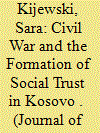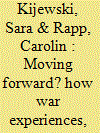|
|
|
Sort Order |
|
|
|
Items / Page
|
|
|
|
|
|
|
| Srl | Item |
| 1 |
ID:
159247


|
|
|
|
|
| Summary/Abstract |
While a new, growing subset of the literature argues that armed conflict does not necessarily erode social cohesion in the postwar era, we challenge this perspective and examine how civil war experiences shape social trust in Kosovo after the war from 1998 to 1999. Based on a nationwide survey conducted in 2010 and the disaggregated conflict event data set of the Armed Conflict Location & Event Data Project, we simultaneously analyze the impact of individual war-related experiences and exposure to war in the community through hierarchical analyses of twenty-six municipalities. Our findings confirm that civil war is negatively related to social trust. This effect proves to be more conclusive for individual war experiences than for contextual war exposure. Arguably, the occurrence of instances of violence with lasting psychological as well as social structural consequences provides people with clear evidence of the untrustworthiness, uncooperativeness, and hostility of others, diminishing social trust in the aftermath of war.
|
|
|
|
|
|
|
|
|
|
|
|
|
|
|
|
| 2 |
ID:
169003


|
|
|
|
|
| Summary/Abstract |
How does civil war shape the prospects of lasting peace between formerly opposing ethnic groups after the end of violence? This article addresses the complex relationship between war experience, interethnic attitudes, interethnic forgiveness, and the willingness to permit basic civil liberties to former enemies in the context of postwar Sri Lanka. Despite the end of the 26-year-long civil war in 2009, social and political tensions between the two largest ethnic groups, the Sinhalese and the Sri Lankan Tamils, still prevail. Political tolerance is in the literature considered a crucial micro-level condition for peaceful coexistence, yet, its determinants, in particular the role of war experiences, have not received sufficient attention. Using new and unique all-island representative survey data (N = 1,420), we examine the mutual permission of civil liberties of these two ethnic groups. Our analyses reveal two important findings: first, the likelihood of granting civil liberties varies by civil liberty and ethnic group. Whereas most members of both ethnic groups are willing to grant the right to vote, to hold a speech, and to hold a government position, the right to demonstrate is highly contested, with only low shares of both Tamils and Sinhalese being willing to grant the other group this right. Second, the structural equation models reveal that the direct impact of war exposure is less powerful than expected and depends on the political right in question. Not forgiving the other ethnic group, partly driven by war experience and ethnic prejudice, appears to be a more consistent predictor of intolerance. These results imply that postwar efforts to further forgiveness are important to promote political tolerance and thereby long-lasting peace.
|
|
|
|
|
|
|
|
|
|
|
|
|
|
|
|
|
|
|
|
|